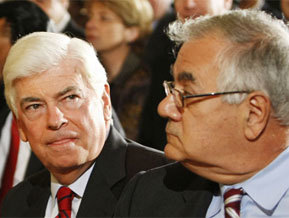Broadening the tax base and lowering tax rates, the current whiz-bang solution to both the government debt problem and the recession, has the support of Sen. Dick Durbin (D-IL) from the political left and Sen. Tom Coburn (R-OK) on the political right. That in itself ought to make folks suspicious.
The first question that should be asked is why some economic activities are taxed differently from others. One model is that government can easily tax politically unpopular firms and individuals in order to fund programs for favored constituencies. This is a form of the free-lunch idea. If it were true, there would be no limit on the size of government. Although many of us believe the government is too big, it cannot be infinitely large.
The alternative theory is that taxes are the prices for government services. Since taxpayers consume different amounts of government services, they are not all charged the same tax price.
Focus on Interest Rates, Capital Gains
Many of the “tax expenditures” targeted by the debt negotiators have to do with interest rates and financial instruments such as capital gains. These interest rates are now pegged at very low levels by the Federal Reserve. The three-month, six-month, and 12-month Treasury bills are at zero interest.
This is where the federal government borrows most of its money. Longer-term rates are also at historically low levels. As interest rates rise (with the help of the Federal Reserve), this will create a huge increase in future taxation. Investors and homeowners with mortgages are not under-taxed today. Nor are renters who pay the tax in their rents.
Broadening the tax base is too complex to be done right in the short run. Moreover, raising taxes will retard the recovery and postpone the necessary reduction in government spending. This is not a solution to our economic problems. Raising taxes will make those problems worse.
Heavy Toll from More Regulation
Proposed regulation under Dodd-Frank, the forced reduction in energy consumption by electric utilities, and Obamacare regulations will also make economic conditions worse.
The federal government needs to get out of the way so that businesses and investors now holding trillions of dollars of cash will put that money to work in stimulating the economy.
Jim Johnston ([email protected]) is The Heartland Institute’s senior fellow for energy and regulatory policy and a member of its Board of Directors.





